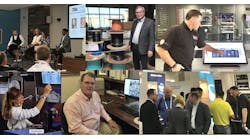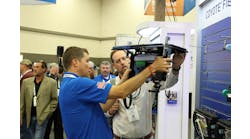Latest from Professional Development/Leadership
HUMAN NETWORK: The Silent Selling Tool We All Have
Selling is something everyone does each and every day. Every conversation is a selling moment and a perfect opportunity to leave an indelible impression with whom you are speaking. That impression you leave can have other people wanting and clamoring to engage you.
But wait — there is another selling tool that everyone uses every day. It is used more than conversation and many people do not have an active realization of how critical this tool is to success. Curious as to what it is? Here you go:
Presence.
Presence is much more than you being physically present. It means how you present yourself in every situation you are in.
It’s how you show up and engage people.
Presence is how people perceive you as being interested in them and their business.
Presence is how people see you as being in the game.
Your ability to demonstrate your presence is a powerful — and potent — silent selling tool, and one that is all too often underestimated and misunderstood.
In fact, presence is a skill that is at times not respected. You have to have respect for yourself and others to be present.
Your presence creates an indelible impression on others and profoundly influences their very desire to engage and work with you.
If you are present and can show it, you will find many more people who want to work with you and be your customer. It’s that simple.
So what is this thing called "presence"? It is not just one thing that you do — it’s a combination of behavior, body language, and appearance.
Presence means much more than just being physically there.
It means that you are showing that you want to be there. It’s showing that you are emotionally connected. An emotional connection demonstrates your dedication to being engaged and contributing. Presence displays your enthusiasm.It means that when you are with an audience, such as a training workshop or listening to a speaker, you are sending a message that you want to be there. How do you send that message? Keep reading!
Presence is body language.
Eye contact, listening skills, and how you sit and show your interest is monumental to your presence and subsequently your success. If you are attending a class or seminar, how you sit and show you are paying attention says volumes. If you are sitting in a colleague’s cube or office, or in a meeting with a client or your manager, how you present yourself through your body language means a great deal to the perception of your interest level.
Presence is being self-aware.
Highly successful people are highly aware of how they are acting, and how their behavior is perceived at all times. They make their ability to be present work for them! Being proactively aware of your presence means you are in control and can make success happen.
Do you know what else highly aware and present people do very well? They know through acute self-awareness when they have acted or behaved in a way that sends a negative message or has the wrong effect on people. People who are self-aware and present are comfortable with being vulnerable and owning their behavior. Presence is being accountable for who you are and how you act.
Presence is how you put yourself together.
Remember "dress for success"? Well, it never stopped being important. Looking good means feeling good, and that screams presence. You don’t need to spend a lot to look great, and it will provide a boost to your presence and your job performance. Shined shoes, a tie tied correctly, pressed clothes, and attention to detail, takes very little time and does not have to be expensive. It takes being proactive by asking yourself Does how I appear help me achieve presence? When you take the time to look good, you say you care about many things — and people take notice.
Presence is not taking yourself too seriously.
There is an expression that absolutely fits the bill here: Get over yourself.
People who are present are confident and self-assured.
Another way of expressing this would be to say that people who are very present do not have to be the smartest person in the room. They have their ego in check and, as a result, are more present and visible to people that one could ever imagine.
Not having to prove yourself right is an incredibly compelling way to sway and convince people of something. People who show up to prove others wrong or can’t keep their own insecurities in control just wind up silently telegraphing a message that they are not in the game and have an agenda that is their agenda only.
What’s my name?
Those who are truly present use people’s names and use them often. When people hear their name used, they see that the person who they are speaking with is actually interested in their time and interested in them. Use your prospect’s name at the right time and interval. For example, when meeting someone, say "Nice to meet you, Ann" instead of just "Nice to meet you." Or when you’re conversing, seek understanding by saying, "Mike, does what I’m suggesting work for you?" instead of "Do you understand?" Using someone’s name naturally engages them and displays your level of engagement!
Your presence says everything about you and how you want people to see you. Don’t ever underestimate how your presence telegraphs a message to others. Being present is enthusiasm, passion and positive energy. Is that you?
About the Author: Todd Cohen, CSP, is an accomplished and sought after speaker, sales culture expert and author of Everyone’s in Sales and Everyone’s in Sales; STOP Apologizing. Todd’s dynamic and motivational presentations are based on the foundation that regardless of career path or position, everyone is a salesperson. Since 1984, Todd has led sales teams to deliver more than $850 million in revenue for leading companies including Xerox and Thomson-Reuters. For more information, please visit www.ToddCohen.com.




